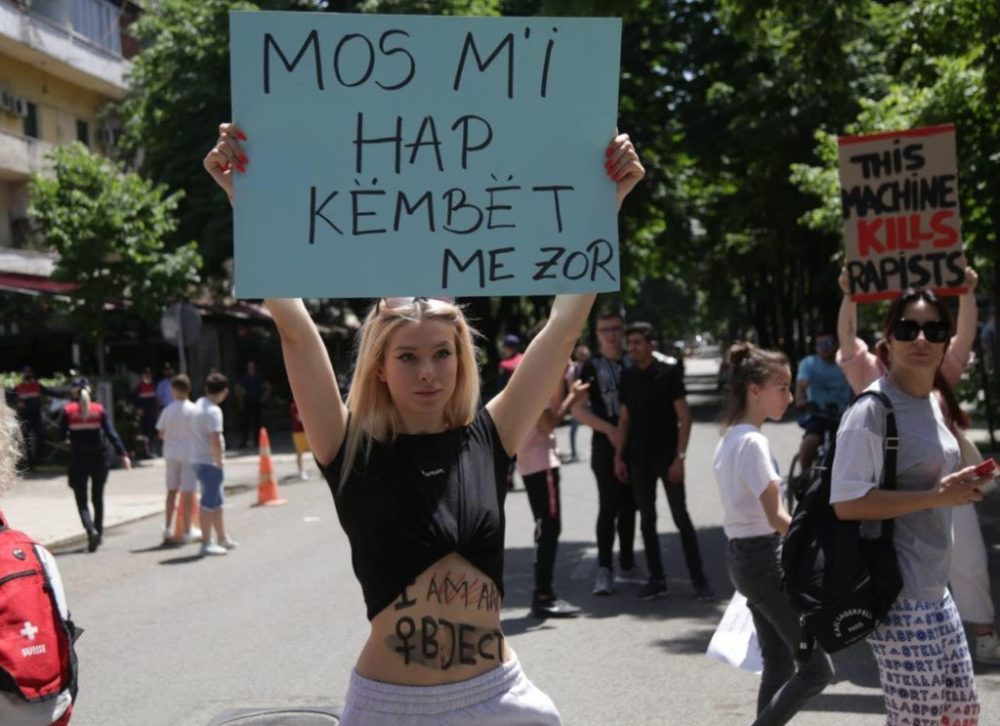By Çapajev Gjokutaj
“Protest with the motto ‘Educate the boy!'”. This headline was repeated last week in some of the news coverage of civil society gatherings in Rrëshen, Tirana, Shkodra, Fier and other cities. These rallies were organized to protest against the rape of a 15-year-old girl from Mirdita, a rape committed by five men and young people from the village of Tarazh, who for several months had passed the minor hand in hand, blackmailing her with the publication of a videos.
This work of educating the boy as a medicine to cure the rape wound has a logical motivation. The culture of rape is also related to the male tendency for domination, violence and aggression, a tendency that resembles beyond the human with which it is encountered in other mammals as well. Probably we are dealing with a natural predisposition, but in humans it takes more pronounced forms and necessarily even more sophisticated because it is also nourished by cultural factors such as patriarchy, sexism, misogyny, pornography, etc.
It is a useful social investment if we educate today’s boy to see in the girl a variant of himself, a friend who lives and acts next to him, an intellectual and spiritual ethnicity who judges, appreciates and feels like him, in a word to educate him that to look at the other ONE, somewhat different, but very equal to him. Educating the boy in this way would be a valuable investment, which would help alleviate many problems of gender relations, cohabitation in the family, including wounds such as rape, which are adjacent to barbarism. Not to mention that the boy himself would win because the ability to build a relationship with a friend or partner and to feel empathy beautifies life and makes him richer because it pushes you to experience the worries and joys of the other.
Anyway, educating the boy with gender equality norms would hardly solve the problems I just mentioned, it would hardly even bring about any significant change. In order not to lose the toruan in theoretical attitudes let us approach more simply and more concretely.
It is reported that the family of the raped minor in Mirdita has asked to leave the village. The same thing was demanded and realized by the family of the girl who was raped in Babrru some time ago, even that of Kavaja. Even the family of the unfortunate Kavaja was not satisfied with the trauma of the abused daughter, but had to face mini-protests of residents, who demanded her removal as a measure to protect the namuz of the city.
Such reactions, which follow a good part of the sexual abuse of minors, prove that in our country, starting from the capital to the villages of the suburbs, the mentality that blames the girl or the woman for every anomaly and scandal in the country remains strong and almost dominant. gender relations.
It was a good thing and necessarily useful the reaction of the civil society against the rape of the Mirdita minor. Hundreds of young people took part in protests organized in several cities. The problem is that in addition to this civic attitude that condemns rapists and demands the increase of preventive measures by society and the state, the mentality that blames the girl, the approach that blames the victim and in one way or another protects and amnesties abusers and criminals.
In all likelihood, the amnesty approach seems to be more effective than the civic approach. The latter is manifested once in a while, in activities organized by various associations that are more outside than inside the community. The amnesty approach, on the contrary, operates from within and continuously, without waiting for calls and organizations, and brings to mind the moth or rust they bite without stopping for a moment.
The mentality that amnesties rapists or rapists and blames girls and women, seems to be more active because it is nourished daily by a range of real factors of a wide range that begins with patriarchal remnants of Baba Qemo’s time and climbs to ‘modern’ phenomena like sexism , pornography, trafficking and others that tend to present girls and women as objects in the service of husband or son.
The bad thing is that the media and society in general talk little about such phenomena and mainly when there is a reason such as rape or murder. The impression is often created that we talk about such phenomena only when we are forced because the next scandal in our hands explodes. The ‘#metoo’ movement, for example, denouncing sexual abuse was widespread, including countries such as Iran, Palestine and Turkey, and even our neighbors like Serbia and Greece, but it could not come to Albania. Not that we have not had and do not have sexual abuses of all kinds, but that we continue with the age-old tendency to turn such topics into taboo.
We talk quickly and superficially only about the scandals of the moment, the ones that erupt and we can no longer hide them, then we return to the political soap opera of the day with the eternal characters Rama, Berisha, Meta, Basha and I told you. This kind of political capricious discourse not only addresses some of the problems we have in various walks of life, but also serves as hashish. It is likely that in media discourse we cultivate much more cannabis than in hidden forest junk…






